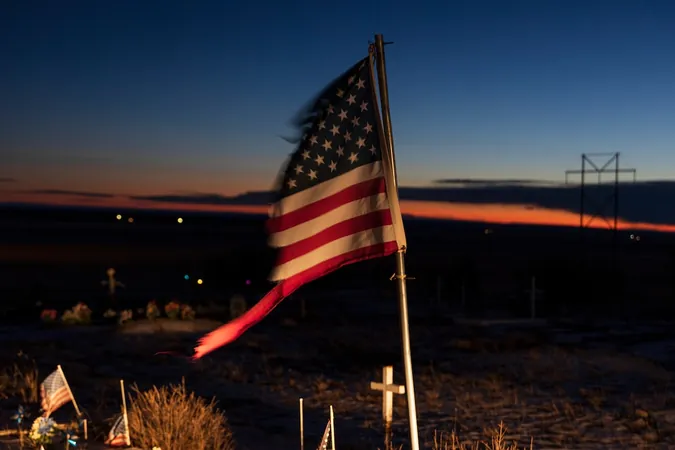
From Obama to Trump: The Transformation of America's Aggrieved Heartland
2025-01-17
Author: Jacob
Introduction
In the lush and towering forests of Washington State's Olympic Peninsula, changed lives hold a compelling story. The region, once renowned as the lumber capital of the world, stands as a testament to the transformation of America's political and social landscape. Towering Douglas firs, some reaching nearly 100 meters, offer a nostalgic glance at the prosperity that flowed from trees felled in the pursuit of the American Dream. Yet, a steep decline looms over Grays Harbor County, where job opportunities have vanished and despair has taken root.
The Impact of Industrial Change
Local resident DJ Jennings recalls his aspirations as a teenager working in a log-sorting yard. But like many in Grays Harbor, his hopes were dashed when industry changes brought by the decline of logging jobs coincided with environmental policies aimed at preserving the habitat of the spotted owl. The impacts of these decisions are still felt today: high poverty rates, rising drug overdoses, and an income gap that widens daily.
Political Shift in Grays Harbor County
Once a steadfast bastion for Democrats, Grays Harbor pivoted dramatically in 2016, joining 181 counties nationwide that swung from supporting Obama to Trump. Their votes reflected more than political shifts; they revealed a sense of alienation and a yearning for disruption. As Jennings noted, “I supported Obama, but I felt left behind. Trump speaks to those who are tired of the status quo.”
Wider Implications of the Shift
Historically democratic strongholds such as Grays Harbor County, Jefferson County in Texas, and Roosevelt County in Montana have mirrored this change. Jefferson County, long a Democratic enclave, showed the same unease. Former Democratic officials like Jeff Branick articulated a widespread sentiment: 'The party has moved too far left,' he suggested, noting that its values no longer aligned with those of many constituents.
Trump's Influence on Voter Sentiment
Despite the predictions of critics, Trump's re-election indicates he is part of a broader reshaping of American politics. His policies, promising radical economic shifts from tariffs to immigration reforms, resonate with voters anxious about their futures. Nationwide, resentment toward traditional party allegiances has provided fertile ground for Trump's brand, which some see as a stark departure from both Republican and Democratic orthodoxy.
Common Grievances Across Pivot Counties
Across these pivot counties, voters—spanning racial and demographic backgrounds—share a common grievance: a belief that they have been overlooked by the political elite. In Jefferson County, the economic foundation built on industrial strength and a diverse workforce has been rattled. Once a reliable Democratic stronghold, the county is now characterized by growing Republican support, as residents feel abandoned or betrayed by policies they perceive as dismissive of their needs, especially regarding energy jobs.
Indigenous Voters and Their Response
In Roosevelt County, Montana, the story echoes. Despite deep-seated grievances against Trump, many Indigenous voters have turned to him, viewing his promises as a break from ineffective governance. A new generation, weary of the status quo and tired of traditional party failures, emerges. As Scott Azure, a local resident, articulated, 'Whether red or blue, politics here don’t make a significant difference. We are still struggling.'
Economic Statistics and the Middle Class
This narrative of disenchantment is compounded by striking economic statistics that reveal a deeper issue: a shrinking middle class. As households across the U.S. witness falling incomes while the wealthy accumulate more wealth, those in pivot counties endure stagnation. Reports reveal that median incomes in these regions lag significantly behind state averages, with poverty and unemployment rates climbing.
Concluding Thoughts
Fate seems to tie these stories together—a collective pushing back against governments that residents feel have ignored them. As they polarized towards the camps of Trump and the Republican Party, they unearth a discontent that spreads beyond mere electoral strategy into a realm of existential and economic dread.
In essence, the stories from Grays Harbor, Jefferson, and Roosevelt Counties illustrate a bellwether for the U.S. We see a complex tapestry of changing allegiances, cultural conflicts, and the fiery cry of rural America yearning for authenticity in representation. This is no longer just about political figures; this is about voicing the pain of communities trapped in cycles of neglect, longing for recognition, and searching for solutions in a fractured political landscape.
As the nation braces for another possible Trump administration, questions linger: Can restoring faith in governance address the underlying issues of poverty and dislocation? Will these pivot counties continue to be harbingers of discontent? The heart of America, it seems, beats with uncertainty—but it pulses undeniably with the desire for change.









 Brasil (PT)
Brasil (PT)
 Canada (EN)
Canada (EN)
 Chile (ES)
Chile (ES)
 Česko (CS)
Česko (CS)
 대한민국 (KO)
대한민국 (KO)
 España (ES)
España (ES)
 France (FR)
France (FR)
 Hong Kong (EN)
Hong Kong (EN)
 Italia (IT)
Italia (IT)
 日本 (JA)
日本 (JA)
 Magyarország (HU)
Magyarország (HU)
 Norge (NO)
Norge (NO)
 Polska (PL)
Polska (PL)
 Schweiz (DE)
Schweiz (DE)
 Singapore (EN)
Singapore (EN)
 Sverige (SV)
Sverige (SV)
 Suomi (FI)
Suomi (FI)
 Türkiye (TR)
Türkiye (TR)
 الإمارات العربية المتحدة (AR)
الإمارات العربية المتحدة (AR)